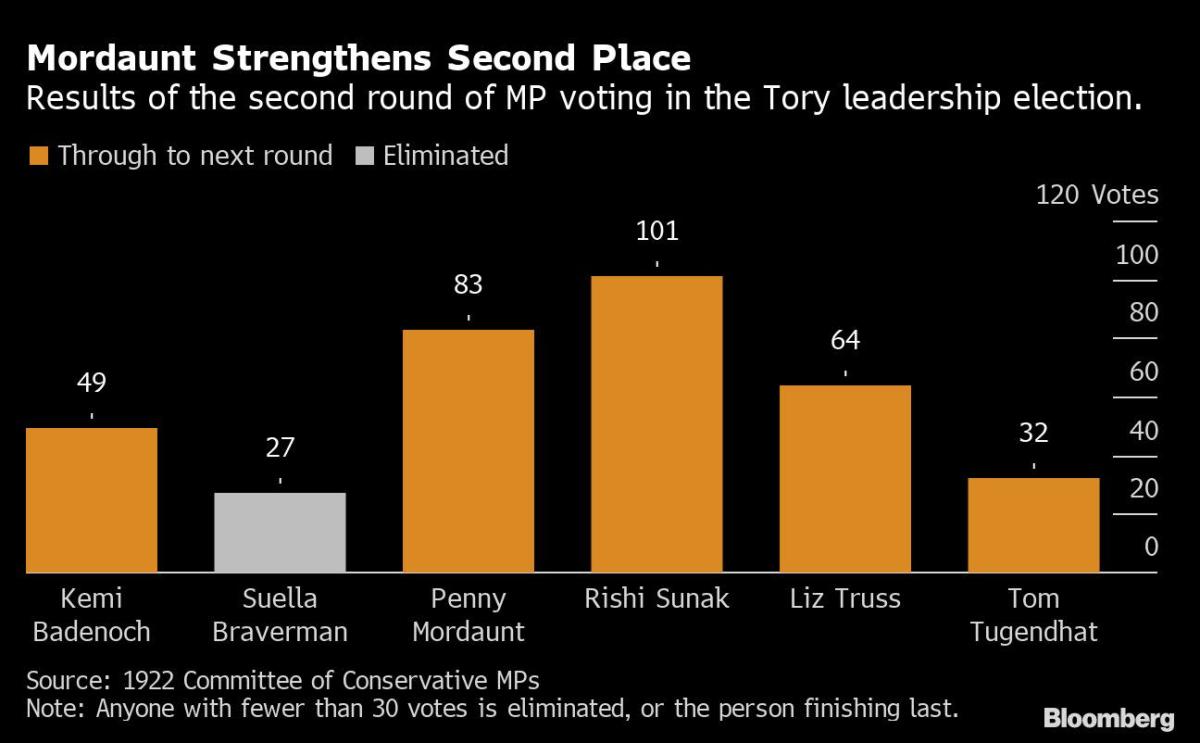
(Bloomberg) —
Most Read from Bloomberg
Two days before a drunken Conservative MP allegedly assaulted two men in an exclusive members’ club — a scandal that would soon scupper Prime Minister Boris Johnson — Penny Mordaunt was in the same venue, networking in a more traditional way.
Mordaunt, a trade minister in Johnson’s government, was at the historic Carlton Club in central London on June 27, making an after-dinner speech and entertaining Tories at a £95-a-head ($112) dinner.
The former defense secretary, 49, has long been a regular on what’s known as the rubber chicken circuit, social events for the party members and activists — often elderly, often male — who elect Conservative leaders.
It’s a grinding grassroots tour, one that ensured she was quickly able to take advantage when Johnson fell on his sword, resigning amid a swirl of scandal on July 7.
After two rounds of voting by Conservative MPs in the contest to become party leader and the next UK prime minister, Mordaunt — little-known outside Tory circles — sits in second place, behind only former Chancellor of the Exchequer Rishi Sunak.
Ahead of a second and decisive week of Westminster voting, after which just two candidates progress to a vote among party members, Mordaunt is seeking to fend off the challenge of Foreign Secretary Liz Truss and progrees to a popularity contest among people she has been courting for years.
Her early success has ensured a swift backlash from rivals. They point to her lack of Cabinet-level backing and brand her as inexperienced. Accusations from MPs speaking privately include that Mordaunt is a part-timer with no clear vision of how to run the country. On Thursday, former Brexit Secretary David Frost said Mordaunt showed a lack of commitment as his deputy, and that he had urged Johnson to fire her.
The attacks continued in Friday night’s TV debate, with rivals criticizing her tax and spending proposals and her position on transgender rights. She later defended herself in an interview with the Telegraph.
Yet Mordaunt’s run at Downing Street is a campaign built on more than 20 years as an activist.
Networking has helped Mordaunt become quietly popular with members, one backer said, contrasting her career with the rapid rise of multimillionaire Sunak and the more complicated past of Truss, who was once a Liberal Democrat.
A former colleague at Conservative Party campaign headquarters at the turn of the century observed that Mordaunt had followed the “Theresa May playbook,” vacuuming up support behind the scenes over time like the former prime minister did, including at the Women2Win networking group, and waiting for the right moment to stand for the leadership.
At her official launch event last Wednesday in a packed, sweltering side room at a Westminster restaurant, Mordaunt’s pitch focused on patriotism, high defense spending and a tax cut on petrol. She name-checked former Prime Minister Margaret Thatcher — a heroine to staunch Tories — within the first two minutes.
Patriotism can be a hard concept for British politicians to articulate. Mordaunt “can remember exactly” where hers flows from. In 1982, aged nine, she stood at the Hot Walls, site of a historic military fort in the southern English city of Portsmouth, watching a Royal Navy taskforce set sail to recapture the Falkland Islands.
“Witnessing it, and Thatcher’s resolve at the time — well, I knew my country stood up to bullies,” she said at her launch.
Momentum grew that afternoon as a YouGov poll put her ahead among party members. Then, in the first round of voting, Mordaunt broke through, finishing second behind Sunak and pushing Truss into third place.
At a lavish “Best of British” party held later that day, one MP ally said that while Sunak had a strategic approach, his long-term efforts were focused on Westminster. By contrast, Mordaunt, outside Cabinet, spent time wooing Tories nationwide. Local associations advised their MPs to pick Mordaunt, the person said, speaking on condition of anonymity.
At the party, held in the garden of Westminster Abbey, Mordaunt and supporters were excited about the day, highlighting social media reaction to her speech and the encouraging YouGov poll. A Royal Air Force brass band played show tunes, Paddington Bear and Peter Rabbit milled around, while performers styled as Victorian strongmen formed human pyramids. Guests were served fish and chips in cones and English sparkling wine.
The party was organized by Chris Lewis, a long-time Mordaunt collaborator who co-wrote a book with her earlier this year. In their post-Brexit vision for the nation, the pair wrote that trust — a key focus of Friday night’s debate — is a “transcendent” British quality.
Tories who back Mordaunt may have to take her at her word. So far, she has outlined just an overarching vision of a small-state, low-tax country.
Her team knows she needs to beat Truss in order to make final two. Aides have vowed to fight a clean campaign, but may need to give further details on tax cuts, or harden her position on Europe, to win more votes.
Truss Sends Up a Signal to Tory Right in Race to Lead the UK
Born in Torquay, Devon, Mordaunt’s mother died from breast cancer when she was 15; her father was also diagnosed with cancer during her teenage years and she became a magician’s assistant to help support the family. Her early political life saw her Mordaunt work for Tory party and on both of George W Bush’s successful US presidential campaigns.
A Royal Navy reservist who is dyslexic, she was elected to Parliament in 2005 and entered government in 2014. She became the first woman to serve as armed forces minister, entered the Cabinet as international development secretary in 2017 and was promoted to defense secretary in May 2019. She was then fired by Johnson months later after supporting his rival in the leadership campaign. Since then she has had time to work the party network, one aide said.
Mordaunt has made much of her military links and pledges to stand by the Conservative manifesto commitment to spend 2% of GDP on defense — the Nato target — and to increase it by 0.5% above inflation every year. She’s also an Atlanticist, in favor of strong links with the US.
One ally portrayed Mordaunt as a kind of nuanced liberal Brexiter who doesn’t easily fit into any of the typical Tory tribes. However, they downplayed comparisons with Johnson, the outgoing leader who is also hard to categorize. While Mordaunt is fun, the MP said, the party has had too much of Johnson’s kind of fun.
Mordaunt’s idea of fun appears to include not taking herself too seriously. In 2014, she appeared on the reality TV show Splash!, a celebrity diving show, to raise funds for her constituency.
A year earlier she made a parliamentary speech on poultry welfare laced with innuendo to settle a bet with Navy comrades. She also drew cross-party laughter by highlighting the inadequacy of women’s military training. “I felt that the lecture and practical demonstration on how to care for the penis and testicles in the field failed to appreciate that some of us attending had been issued with the incorrect kit,” she said.
Mordaunt may yet trip up on similar ground, with leadership rivals accusing her of inconsistency over transgender rights. In Friday’s debate, Badenoch sought to portray Mordaunt as an advocate of gender self-ID while in government. Mordaunt denied that.
“I’m a woman, I’m a biological woman in every cell in my body,” she said. A man who had legally transitioned is “not the same as me,” she added. That doubled down on an assertion made at her campaign launch, which led LGBTQ+ groups to complain that Mordaunt was backing away from an earlier commitment to trans rights in order to shore up support in the Tory Party.
Her position is not enough for party critics, with vanquished leadership rival Suella Braverman citing the issue when backing Truss (Braverman also cited ambiguity over tax cuts). Tory activists worry privately Mordaunt is hiding policy beliefs that won’t become clear until after she enters No 10.
So far, Mordaunt’s headline policy is a pledge to cut VAT on fuel by 50% to help ease the cost-of-living crisis, a plan criticized as uncosted by Sunak on Friday, but she has not gone as far as others in the race to offer tax cuts.
She has pledged to give every family a childcare budget, with a choice of how they spend it, and says her key fiscal rule is that debt as a percentage of gross domestic product will fall over time.
Her campaign lacks Cabinet support but has endorsements from MPs such as Andrea Leadsom and David Davis on the right and centrists such as Caroline Nokes and Caroline Dinenage. Campaign manager Leadsom has been briefing journalists on Mordaunt’s economic plan, suggesting she could become chancellor if she wins. Mordaunt’s “foot soldiers” also include MPs from the 2019 intake, including some in Brexit-backing “red wall” seats.
A member of Mordaunt’s team working with activists said they were overwhelmed by offers of support and had been instructing supporters to urge MPs to back her into the final two.
One Mordaunt ally said the candidate could be something to everyone, and that MPs could project their own political views onto her.
While that could be an advantage, another friend voiced a fear: that Mordaunt has not surrounded herself with political bruisers, people prepared to get their hands dirty getting her elected. She’s too nice, the friend complained.
Most Read from Bloomberg Businessweek
©2022 Bloomberg L.P.




